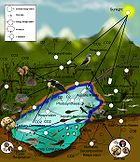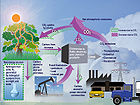- Depensation
-
In population dynamics, depensation is the effect on a population (or stock) whereby, due to certain causes, a decrease in the breeding population (mature individuals) leads to reduced survival and production of eggs or offspring. The cause may be either:
- predation levels rising per offspring (given the same level of overall predator pressure), or
- the allee effect, which is the reduced likelihood of finding a mate.[citation needed]
Although depensation is often considered in relation to the population being harvested (especially fish), the actual level of harvesting, by definition, is not part of depensation.[citation needed]
Critical depensation
When the level of depensation is high enough that the population is no longer able to sustain itself, it is said to be a critical depensation. This occurs when the population size has a tendency to decline when the population drops below a certain level (known as the "Critical depensation level"). Ultimately this may lead to resource depletion, the population or fishery's collapse, or even local extinction.
The phenomenon of critical depensation may be modelled or defined by a negative second order derivative of population growth rate with respect of population biomass, which describes a situation where a decline in population biomass is not compensated by a corresponding increase in marginal growth per unit of biomass.
See also
External links
Categories:- Population
- Extinction
- Ecological processes
- Biology stubs
Wikimedia Foundation. 2010.


